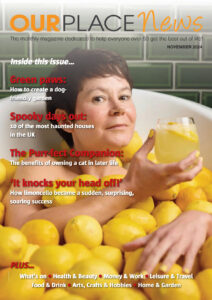Whether it’s a hilltop, a coastline or a building, having a meaningful place in your life has a significant impact on well-being.

Mature Times reports that new research commissioned by conservation charity the National Trust reveals that people with a connection to a special place in their lives, whether it’s a place they escape for contemplation, a place of natural beauty or somewhere they go to remember a loved one, report higher levels of happiness and life satisfaction than those without a place of importance. These benefits also extend beyond the visit, influencing general well-being in day-to-day life.
Working with leading researchers, Walnut Unlimited, the National Trust has identified through qualitative and quantitative studies that having a special place enhances the Five Ways to Well-being, as recognised by The New Economics Foundation.
Those with a special place are more likely to give both their time (63%) and money (63%) compared to those without a special place (55% and 53% respectively). The findings also reveal that having a special place affects levels of loneliness, with almost half (49%) of those without a special place stating they often feel lonely, compared to 45% of people with a connection to a place.
Furthermore, those with special places record higher levels of happiness and life satisfaction, stronger relationships with others, and better physical activity and awareness of emotions when compared to those without a special place.
Christina Finlay, National Trust Director of Insight and Data, comments: ‘Our previous research from 2017 showed that places which are meaningful to us generate a significant response in the brain commonly associated with emotions. With our latest research we explored how this connection to place is intrinsically linked to heightened well-being, further unpacking how important places are to people.
‘Our findings suggest that not only do people have specific positive emotional experiences when they visit favourite places, but these emotions permeate into their life back home or at work. So, whilst places that are important to us aren’t the only factor in heightened well-being, the results explore how having somewhere that holds meaning in our lives contributes to higher levels of happiness and life satisfaction.’
When it comes to the types of places that people feel strong connections to, 58% of people have stronger connections with the outdoors, including coastlines and beaches, woodland and farms, and mountains and hills. This was followed by 23% having a connection with an urban location, including seaside towns and resorts, and other towns and villages.
82% of people, feel it is likely that their special place will always be there, and if it were to disappear or change, 69% say it would affect them in a negative way. This emphasises the important role organisations like the National Trust have in protecting special places forever, for everyone, and ensuring everyone can feel the benefits these places have to offer both now and in the future.
Christina Finlay continues: ‘No matter whether the connection is with an outdoor or urban place, our research shows the intrinsic link between connections to place and the triggering of positive emotional experiences, a sense of belonging and overall increased well-being.’
(Story source: Mature Times)

